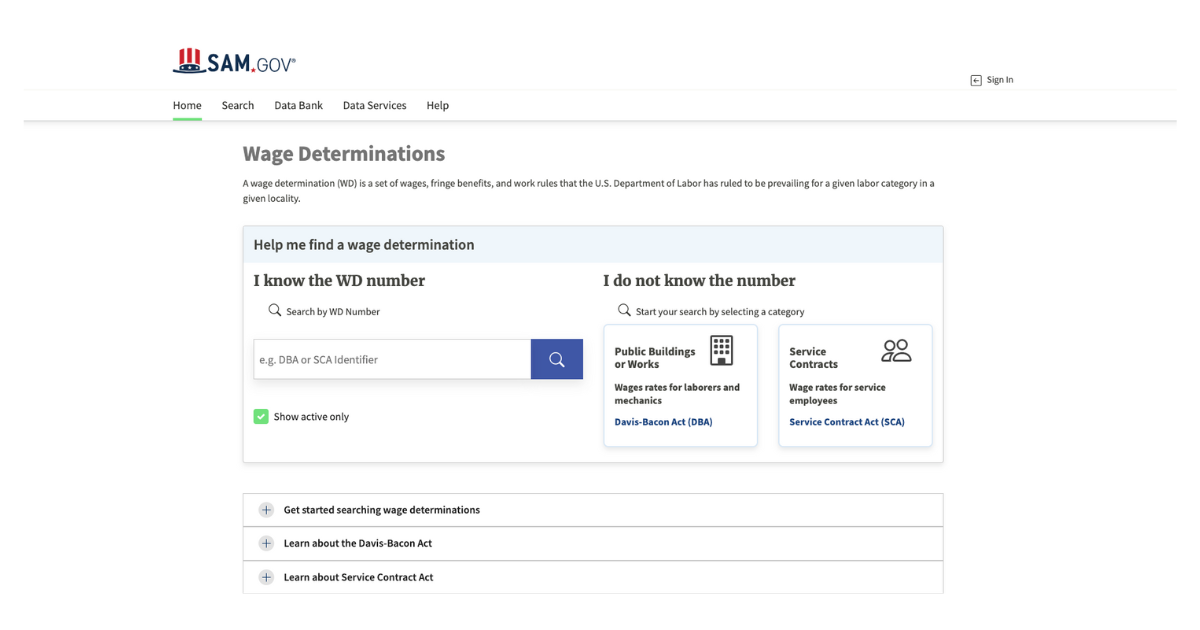The Davis-Bacon Act and the FAR
The Davis-Bacon Act is a law that ensures workers are paid fairly for their work on public projects. The law requires that contractors and subcontractors pay prevailing (average) wages as determined by the Department of Labor based on the location of where the work is performed.
The Davis-Bacon Act applies to all contracts for construction, alteration, and/or repair, including painting and decorating, of public buildings or public works in excess of $2,000. The prevailing wage rates must be paid to all workers employed in the execution of the work, including laborers, mechanics and other workers employed on the site of the public works project (Davis-Bacon Act).
The Act was passed by Congress on June 25, 1931 under President Herbert Hoover as a last attempt to resolve issues that were preventing work from being completed on public buildings and memorials.
The Department of Labor (DOL) typically establishes these prevailing wages, which are typically updated annually but can be altered at any time. In other words, the Davis-Bacon Act might require contractors to pay their workers increments as soon as the government exercises options, throughout the contract term.
The Davis-Bacon Act is covered by the Federal Acquisition Regulation (FAR), which provides a contracting officer (CO) many options for incorporating rising labor expenses into government contracts via designated clauses that may be included. The "no-adjustment" clause, for instance, should be on everyone's radar when they sign such a contract.
The contractor is informed that no price adjustments will be made unless they are expressly stipulated in the contract. That means you're out of luck unless you negotiate a method or avenue for future option years' higher prevailing wages into your contract.
The Case of Gulf Pacific Contracting, LLC
The Armed Services Board of Contract Appeals (ASBCA) recently considered the prospect of a contractor getting equitable relief despite having a "no-adjustment" provision in their contract.
Gulf Pacific Contracting, LLC had a contract to provide a range of construction-related services at Hurlburt Field in Florida under which the Government could choose to exercise one-year options at any time. Simultaneously with the DOL's exercise of the first-year option, it issued new wage determinations that mandated Gulf Pacific to raise its wages for certain workers.
The CO refused to grant Gulf Pacific's Request for Equitable Adjustment (REA) because it deemed the no-adjustment clause inapplicable, so the company sued the government. The ASBCA held that the inclusion of a no-adjustment clause precluded the Government from providing any more money. The court also found that the government was in breach of its duty to act in good faith and deal fairly when issuing the wage determinations. The case is Gulf Pacific Contracting, LLC, ASBCA No. 53385 (2016).
THE NO-ADJUSTMENT PROVISION:
Under the Federal Acquisition Regulation (FAR), equitable adjustments are to be pursued through the submission of a written claim by the contractor. In this case, Gulf Pacific Contracting had a clause that stated "There will be no adjustment in the price of the contract as a result of an unjustified increase in cost or an unjustified failure to proceed."
In its claim for equitable relief, Gulf Pacific argued that the increase in cost was justified because of the Ordinance Wage Determination (OWD) issued by the Department of Labor.
The OWD determined that Gulf Pacific owed its employees a wage rate beginning on August 1, 2012 if it had not already been paid. By refusing to grant Gulf Pacific's request for equitable adjustment, the CO denied Gulf Pacific's claim that the contractor would suffer "an increase in cost" if the Government reimposed its wage rates on it.
FAR 22.404-12
The FAR 22.404-12 is a Subsection of the FAR, which sets standards for contracts with construction requirements and option provisions that extend beyond the contract term. In any fixed price construction contract, the CO should include a clause stating one of four methods for giving a wage increase or reduction in labor costs as a result of incorporating current wage determination at the time of exercising an option to extend the contract.
The four methods available for the CO to choose from are:
- No adjustment;
- An adjustment specifically provided for in the contract;
- A price adjustment based on a percentage rate of a published economic indicator specified in the contract; or
- A price adjustment based on actual costs.
Option 1, the "no-adjustment" option, which was used in the Gulf Pacific contract specifically states that:
Sometimes contractors are required to provide separate bids for each option period with the contracting officer not being allowed to adjust the price of the contract as a result of incorporating new or revised wage determinations at the exercise of each option. Generally this is for construction-only contracts with options that are usually expected to not exceed 3 years in total.
The ASBCA found that a requirement in a contract may permit the government to withhold the extra money from a contractor. This is despite any cost being related to an increase in Davis-Bacon Act labor rates, which is affected by a DOL wage determination.
What This Means for Contractors
The need for great care when entering into a public construction contract was previously discussed by the DOL. The holding in Gulf Pacific serves as an important reminder.
Following these three simple steps can help prevent contractors from assuming the risk of federally mandated wage adjustments:
- 1st- One of the most essential things to know is that before signing any construction contract with a government agency, you should understand the comprehensiveness of the Davis-Bacon Act and what its potential effects may be on your labor costs. If required, engage a government contracting attorney for assistance in determining who and what is covered by the Davis-Bacon Act.
- 2nd - Negotiate an option to account for changes in the prevailing wage rates. Make sure that your contract includes a clause to account for annual DOL wage determinations without relying on the REA process to provide relief. Save time and money by negotiating any expected change as soon as possible.
- 3rd – When in doubt, contact a seasoned government contract lawyer for assistance drafting or reviewing your contract.



.png)
